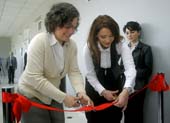UNDP helps Shida Kartli
By Etuna Tsotniashvili
Monday, May 10

Together with Minister of Corrections and Legal Assistance Khatuna Kalmakhelidze, Udovicki opened the new office of the Legal Aid Bureau in Gori, which provides access to legal services for residents of the region, including the economically vulnerable and the displaced. The new office, which serves the whole of Shida Kartli including the Gori, Kareli, Khashuri and Kaspi districts, was opened with the assistance of United Nations Development Programme (UNDP). According to Legal Aid Service Director Irakli Kobidze the Legal Aid Bureau has been functioning since 2007 and employs five public attorneys, consultants and specialists who offer representation in criminal cases, free legal advice and assistance in drawing up legal documents.
The Minister of Corrections and Legal Assistance welcomed the guests and gave her special gratitude to UNDP representatives for implementing this project successfully. The Minister said that the establishment of a state-funded legal aid system is evidence of progress and demonstrates the Government's success in ensuring all citizens, especially the vulnerable and socially unprotected, have access to justice.
“The establishment of the Shida Kartli Legal Aid Bureau is one of the steps forward in the process of legal aid assistance development in Georgia. Each person, and especially the vulnerable, can receive fast and good quality legal assistance in this newly renovated and modern environment, which is particularly important when we take into account the August 2008 events,” Kalmakhelidze stated.
During the visit Udovicki met Shida Kartli Governor Lado Vardzelashvili, with whom she discussed UNDP activities in the region, its future plans and the most acute problems. Vardzelashvili said that UNDP and other international organisations have done a great job, especially since the conflict in 2008. The Governor highlighted water problems in the villages near the administrative border of South Ossetia. After the war the drinking water and irrigation channels, which supplied more than 50 villages, were closed by Tskhinvali. The regional authorities managed to construct the dams to provide additional sources of water to 51 villages, which has partly resolved the problems of irrigation. 5-6 villages however are still without water and the harvest and fruit trees are under threat.
Udovicki also visited Gori University, where UNDP has organised over 30 professional retraining programmes. She then visited the IDP settlement in the village of Teliani, where UNDP has helped build a bath house. 24 year-old Lela Sherazadishvili from the village of Kheiti (now controlled by South Ossetia) said it had been really very hard for them not to have hygiene opportunities and thanked the organisation for its assistance. The settlement, of around 60 families, is now home to more than 30 IDP families. “I miss the friends I knew from early childhood, I miss my former classmates and neighbours. I miss my home village very much. You know what strikes me? Looking at those mountains and realizing that our village is so close but impossible to reach,” Lela told The Messenger. She added that it was very hard to find a means of livelihood at the beginning but the villagers are already trying to move to the next stage and develop the capacity to earn a minimum income.
“My first impression on meeting Georgia and Georgian people is that they are very proud and resourceful people. And while we have been here helping, it has never been charity – we have always helped people who we can see are ready to take this assistance and make something of it,” Udovicki told The Messenger.
On May 6 Udovicki met Prime Minister of Georgia Nika Gilauri and other senior Government officials to discuss the UNDP’s role in accelerating the country’s development, boosting reforms and helping Georgia fully recover from the recent conflict. At the meeting Udovicki said: “We will continue to assist democratic institutions in Georgia to ensure that growth creates more opportunities for the vulnerable and helps reduce poverty and inequality. We acknowledge the challenges the country has faced in the last two years, particularly those caused by the 2008 conflict and the global economic crisis. Moreover we are pleased to note the progress in the reform of governance institutions and the implementation of new economic strategies,” she added.
